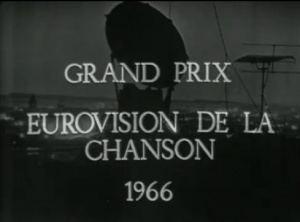Eurovision Song Contest
(→See also) |
|||
| (18 intermediate revisions not shown) | |||
| Line 1: | Line 1: | ||
| - | [[ | + | <div class="image">[[File:Eurovision song contest 1966 title.jpg|300px]]</div> |
<div class="box"> | <div class="box"> | ||
| Line 29: | Line 29: | ||
Berkeley Smith (1957)<br> | Berkeley Smith (1957)<br> | ||
[[Peter Haigh]] (1958)<br> | [[Peter Haigh]] (1958)<br> | ||
| - | Tom Sloan (1959)<br> | + | Tom Sloan (1959, 61)<br> |
| - | [[David Jacobs]] (1960-66)<br> | + | [[David Jacobs]] (1960, 62-66)<br> |
[[Rolf Harris]] (1967)<br> | [[Rolf Harris]] (1967)<br> | ||
| - | David Gell (1969-70)<br>[[Dave Lee Travis]] (1971)<br> | + | [[Michael Aspel]] (1969, 76)<br> |
| + | David Gell (1969-70)<br> | ||
| + | [[Dave Lee Travis]] (1971)<br> | ||
Tom Fleming (1972)<br> | Tom Fleming (1972)<br> | ||
[[Terry Wogan]] (1973, 78, 80-2008)<br> | [[Terry Wogan]] (1973, 78, 80-2008)<br> | ||
[[David Vine]] (1974)<br> | [[David Vine]] (1974)<br> | ||
[[Pete Murray]] (1975, 77)<br> | [[Pete Murray]] (1975, 77)<br> | ||
| - | |||
John Dunn (1979)<br> | John Dunn (1979)<br> | ||
[[Graham Norton]] (2009-) | [[Graham Norton]] (2009-) | ||
Commentary (Radio):<br> | Commentary (Radio):<br> | ||
| - | Pete Murray (1968-69, 72-73)<br> | + | Tom Sloan (1957-58, 64)<br> |
| + | Pete Murray (1959-61, 1968-69, 72-73)<br> | ||
| + | Peter Haigh (1962)<br> | ||
| + | Michael Aspel (1963)<br> | ||
| + | David Gell (1965)<br> | ||
| + | John Dunn (1966)<br> | ||
| + | Richard Baker (1967)<br> | ||
Tony Brandon (1970)<br> | Tony Brandon (1970)<br> | ||
Terry Wogan (1971, 74-77)<br> | Terry Wogan (1971, 74-77)<br> | ||
| Line 54: | Line 61: | ||
[[Caroline Flack]] (2008)<br> | [[Caroline Flack]] (2008)<br> | ||
[[Scott Mills]] (2011-)<br> | [[Scott Mills]] (2011-)<br> | ||
| - | [[Sara Cox]] (2011- | + | [[Sara Cox]] (2011-12)<br> |
Ana Matronic (2013)<br> | Ana Matronic (2013)<br> | ||
| - | Laura Whitmore (2014)<br> | + | [[Laura Whitmore]] (2014)<br> |
| - | [[Mel Giedroyc]] (2015-) | + | [[Mel Giedroyc]] (2015-17)<br> |
| + | [[Rylan Clark-Neal]] (2018-) | ||
== Broadcast == | == Broadcast == | ||
| Line 63: | Line 71: | ||
BBC Television Service, 24 May 1956 to present | BBC Television Service, 24 May 1956 to present | ||
| - | BBC | + | BBC Light Programme, 1957, 1959 to 6 April 1968 |
BBC Radio 1 (also on Radio 2), 29 March 1969 and 21 March 1970 | BBC Radio 1 (also on Radio 2), 29 March 1969 and 21 March 1970 | ||
| + | |||
| + | BBC Radio 2, 3 April 1971 to 24 April 1982, 3 May 1986 to present | ||
BBC Three, 12 May 2004 to 21 May 2015 (Semi-Finals) | BBC Three, 12 May 2004 to 21 May 2015 (Semi-Finals) | ||
| Line 206: | Line 216: | ||
**Paul Goodey (oboeist and tutor at the Royal Northern College of Music) | **Paul Goodey (oboeist and tutor at the Royal Northern College of Music) | ||
**Steve Allen (might be the LBC presenter, or might be the former Deaf School and Original Mirrors singer, or might be neither...) | **Steve Allen (might be the LBC presenter, or might be the former Deaf School and Original Mirrors singer, or might be neither...) | ||
| - | **Zoe Martlew (composer, cellist and [[Maestro]] judge | + | **Zoe Martlew (composer, cellist and [[Maestro]] judge) |
**Keith Hughes (perhaps the music historian involved in compiling various compilation CDs for Universal?) | **Keith Hughes (perhaps the music historian involved in compiling various compilation CDs for Universal?) | ||
**Jasmine Dotiwala (MTV producer and pop pundit) | **Jasmine Dotiwala (MTV producer and pop pundit) | ||
| Line 213: | Line 223: | ||
To mark the contest's 60th anniversary in 2015, the EBU decided to invite Australia to compete as a one-off. The contest has a loyal following Down Under, having been broadcast by SBS for over 30 years. Former ''Australian Idol'' winner Guy Sebastian was chosen to represent Australia at the final in Vienna, singing self-penned song ''Tonight Again''. It was announced that Australia would be able to defend their crown in 2016, in a European city of their choice, should they win. In the event, Sweden took home the honours, however Australia did finish in a respectable fifth place. As a result of positive feedback to Australia's participation, it was announced in November 2015 that the country would be invited to compete in the 2016 contest. However this time they would not be granted a pass to the final, and would have to take part in one of the semi-finals to secure their place in the final. | To mark the contest's 60th anniversary in 2015, the EBU decided to invite Australia to compete as a one-off. The contest has a loyal following Down Under, having been broadcast by SBS for over 30 years. Former ''Australian Idol'' winner Guy Sebastian was chosen to represent Australia at the final in Vienna, singing self-penned song ''Tonight Again''. It was announced that Australia would be able to defend their crown in 2016, in a European city of their choice, should they win. In the event, Sweden took home the honours, however Australia did finish in a respectable fifth place. As a result of positive feedback to Australia's participation, it was announced in November 2015 that the country would be invited to compete in the 2016 contest. However this time they would not be granted a pass to the final, and would have to take part in one of the semi-finals to secure their place in the final. | ||
| + | |||
| + | No contest was held in 2020 [[Impact of Covid-19|as a consequence of the Covid-19 pandemic]]. | ||
== Web links == | == Web links == | ||
| - | [http://www.eurovision.tv/ Official | + | [http://www.eurovision.tv/page/timeline Official site] |
| - | + | ||
| - | + | ||
[http://en.wikipedia.org/wiki/Eurovision_Song_Contest Wikipedia entry] | [http://en.wikipedia.org/wiki/Eurovision_Song_Contest Wikipedia entry] | ||
| + | |||
| + | [http://www.bbc.co.uk/programmes/b0070hvg BBC site] | ||
== Pictures == | == Pictures == | ||
| - | <div class="image"><IMG src="/atoz/programmes/e/eurovision_song_contest/eurovision_logo.jpg" width="300" height="225" border="0" | + | <div class="image"><IMG src="/atoz/programmes/e/eurovision_song_contest/eurovision_logo.jpg" width="300" height="225" border="0"> |
| - | + | ''The pine-needle style logo for the Eurovision.''</div> | |
== See also == | == See also == | ||
| Line 249: | Line 261: | ||
* 2015: [[Weaver's Week 2015-05-24|Semi-final]] | [[Weaver's Week 2015-05-31|Final]] | [[Weaver's Week 2015-06-07#Eurovision Song Contest|Voting analysis]] | * 2015: [[Weaver's Week 2015-05-24|Semi-final]] | [[Weaver's Week 2015-05-31|Final]] | [[Weaver's Week 2015-06-07#Eurovision Song Contest|Voting analysis]] | ||
* 2016: [[Weaver's Week 2016-05-15|Semi-final]] | [[Weaver's Week 2016-05-22|Final]] | * 2016: [[Weaver's Week 2016-05-15|Semi-final]] | [[Weaver's Week 2016-05-22|Final]] | ||
| + | * 2017: [[Weaver's Week 2017-05-14|Semi-final]] | [[Weaver's Week 2017-05-21|Final]] | ||
| + | * 2018: [[Weaver's Week 2018-05-13|Semi-final]] | [[Weaver's Week 2018-05-20|Final]] | ||
| + | * 2019: [[Weaver's Week 2019-05-19|Semi-final]] | [[Weaver's Week 2019-05-26|Final]] | ||
| + | * 2020: [[Weaver's Week 2020-05-24|Europe Shine a Light]] and ''Come Together'' | ||
[[Category:Variety]] | [[Category:Variety]] | ||
Revision as of 10:24, 24 May 2020
Contents |
Host
Produced in the UK in these years:
1960: Katie Boyle (Royal Festival Hall, London)
1963: Katie Boyle (BBC TV Centre, London)
1968: Katie Boyle (Royal Albert Hall, London)
1972: Moira Shearer (Usher Hall, Edinburgh)
1974: Katie Boyle (Brighton Dome)
1977: Angela Rippon (Wembley Conference Centre, London)
1982: Jan Leeming (Harrogate conference centre)
1998: Terry Wogan and Ulrika Jonsson (National Indoor Arena, Birmingham)
Co-hosts
Commentary (TV):
Wilfred Thomas (1956)
Berkeley Smith (1957)
Peter Haigh (1958)
Tom Sloan (1959, 61)
David Jacobs (1960, 62-66)
Rolf Harris (1967)
Michael Aspel (1969, 76)
David Gell (1969-70)
Dave Lee Travis (1971)
Tom Fleming (1972)
Terry Wogan (1973, 78, 80-2008)
David Vine (1974)
Pete Murray (1975, 77)
John Dunn (1979)
Graham Norton (2009-)
Commentary (Radio):
Tom Sloan (1957-58, 64)
Pete Murray (1959-61, 1968-69, 72-73)
Peter Haigh (1962)
Michael Aspel (1963)
David Gell (1965)
John Dunn (1966)
Richard Baker (1967)
Tony Brandon (1970)
Terry Wogan (1971, 74-77)
Ray Moore (1978-79, 81-82, 86-87)
Steve Jones (1980)
Ken Bruce (1988-)
Semi-Finals:
Patrick O'Connell (2004-10)
Sarah Cawood (2007, 09-10)
Caroline Flack (2008)
Scott Mills (2011-)
Sara Cox (2011-12)
Ana Matronic (2013)
Laura Whitmore (2014)
Mel Giedroyc (2015-17)
Rylan Clark-Neal (2018-)
Broadcast
BBC Television Service, 24 May 1956 to present
BBC Light Programme, 1957, 1959 to 6 April 1968
BBC Radio 1 (also on Radio 2), 29 March 1969 and 21 March 1970
BBC Radio 2, 3 April 1971 to 24 April 1982, 3 May 1986 to present
BBC Three, 12 May 2004 to 21 May 2015 (Semi-Finals)
BBC Four, 10 May 2016 to present (Semi-Finals)
Synopsis
WHAT is the Eurovision Song Contest? Or, more exactly, WHY is the Eurovision Song Contest?
I'll tell you why. Desperation. Dodgy haircuts and clothes. Bitchiness. Voting alliances. Forget Survivor and Big Brother, the Eurovision Song Contest is THE original reality show, and its annual audience of 120m people makes it at least twice as big as the US Survivor ever was. Not bad for something that's been going over 60 years.
The ESC was borne out of the San Remo musical festival in the 1950s and its intention was to bring the countries of Europe closer together, a little bit like the other EBU (European Broadcasting Union) innovation Jeux Sans Frontieres. Little did they know that the Eurovision was the one big reason why European integration just wouldn't work.
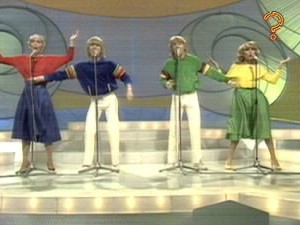 Skirt-ripping action from Bucks Fizz
Skirt-ripping action from Bucks FizzThe Eurovision Song Contest, the self-proclaimed "Greatest Gameshow on Earth" is an international institution. The contest was first staged in Switzerland in 1956, and the UK has participated every year except 1956 and 1958. Every year on a Saturday in May, representatives from many countries in Europe (and Israel) all congregate somewhere to sing their hearts out and decide which was the best song. The song that gets the most votes wins, the writers and performers win some tatty gold medallions and the real prize is that the winning nation gets the honour to host the following contest next year.
Preparations for the British attack usually began in February with A Song for Europe. Once relegated to Sunday mid-afternoon, latterly on Saturday prime-time, all the finalists on the shortlist (chosen by a panel of experts) do their song on the telly, which is then put to a telephone vote to decide which is the most popular. This becomes the song that will represent us in the forthcoming international contest.
So, come the middle of May, twenty or so representatives from the countries competing descend upon some stadium or theatre in Europe, all with the hope of taking home the honours.
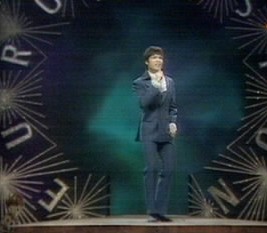 Cliff Richard, who controversially came second with "Congratulations" despite being heavily tipped to win
Cliff Richard, who controversially came second with "Congratulations" despite being heavily tipped to winEach grand finale show has its own distinctive style depending on where it's being held each year. The hosts always speak in English and French with some usage of other languages too. After the opening spiel we get on to the songs. Before each song there's normally a little piece of PR film saying "look how great your host country is!" which seem to have some effort put into them and yet make no sense whatsoever. Look! There's a man fishing (connotation: Look! We might be a modern country, but we still do traditional stuff), but he's quite obviously staring at that castle over there. Zooming into the castle (connotation: Look! We have old buildings!), there's a bloke using a big computer (connotation: look how technologically advanced we are! Compare that to our traditional methods!) then he'll makes some whizzy lines jump out of the screen which will whizz round and form pictures of the members of the band about to perform. Zoom out of the band to find out that the band were in fact in the fisherman's eye. Continue zooming out to see the fisherman. The fisherman catches something - it's the flag of the next country up! Marvellous. Alright so we made that up, but it's not too far from the truth.
Another highlight - before cost-cutting in recent times - used to be the introduction of the conductors for the country about to perform, each one trying to outdo the other one in the nattiness of their evening attire.
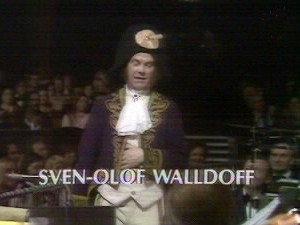 If you think this is ridiculous, see what he wore after the operation
If you think this is ridiculous, see what he wore after the operationSo then, the songs - and what an eclectic lot they are. The rules seem to change regarding the language every year. Some years you must sing in your first language, other years you can sing in any language (i.e. English). This is where we learn about the cultural differences between our partners. Failing that, we'll just laugh at them instead for being so bad. How many Eurovision entries can anybody remember off the top of your head? Well Waterloo, of course, by the wondrous ABBA, Congratulations by ol' Cliff. Perhaps Makin' Your Mind Up, any song with La in the title (including the magnificent La La La). Ding A Dong was in ironic vogue for a while, erm...
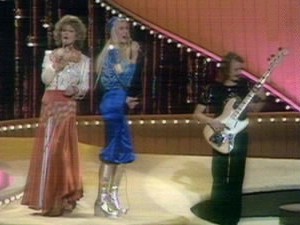 Some ridiculously-attired people who later won the competition
Some ridiculously-attired people who later won the competitionThe one thing you can guarantee from any Eurovision is that at least 80% of the songs will be utter rubbish. However, they might be saved if perhaps they're wearing "interesting" clothes, have "interesting" haircuts or dance "questionably", er, we mean "interestingly". Notably the Germans went through a phase of fielding "humorous" songs, the most notable being by one Guildo Horn. The song was rubbish but was worth watching because he insisted on climbing all over the set for some reason. The next year the German entry was wearing some sort of electric suit which was covered in lightbulbs. And then of course there was Dana International, the world's most famous transsexual winning for Israel with the kicking dance tune "Diva". She was much maligned by the Jews in Israel but was a big hit in the rest of Europe. The Brotherhood of Man on the other hand are pretty much maligned by everybody. But they still won.
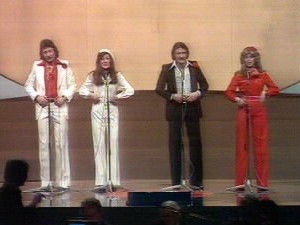 Some ridiculously-attired people who later won the competition (hey, there's a pattern here...)
Some ridiculously-attired people who later won the competition (hey, there's a pattern here...)After all the 25 or so songs have been performed we get a little break. Except! We don't anymore. What used to be the interlude still is an interlude, but in the age of direct democracy we have to work during it. Whereas before a jury of random people would do each countries' voting (in fact they still do, in case of a communication breakdown and to blunt the perceived expat voting phenomenon), now the discerning Euro-viewer is the judge. Yes - it's a televote, hurrah! You pick up the phone and dial like crazy to attempt to get through and log a vote for the country of your choice. All the while Aqua, Riverdance or some 6th Form Musical act entertain in the background.
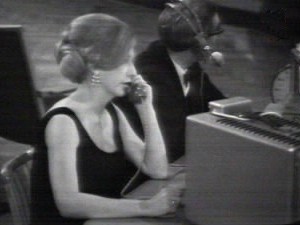 "No, this isn't the number for Domino's Pizza"
"No, this isn't the number for Domino's Pizza"When that's over, the important and interesting bit begins - the point giving. This is always very exciting because with the advent of computer technology you never know what the score board is going to look like or do until it comes on. Normally it's just a screen based affair, but well done to Norway for using a virtual reality affair one year. Classic. Well it excites us, anyway.
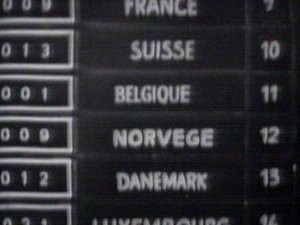 The scores on the doors
The scores on the doorsEach country, in order of performance (or these days, in apparently random order), is called up via satellite link up (of course this has moved on from the olden days of "Hello, London calling..."). It seems customary for each country to say something along the lines of "We just want to thank you for putting on an excellent show tonight," which was very nice first time but ten years later and with every country doing it becomes very tedious.
Each country awards ten other countries points depending on how many phone votes each song got in their country. The tenth most popular gets 1 point (it is customary for the hosts of the show to repeat everything in English and French), 9th two points... all the way up to 3rd which gets 8, 2nd which gets 10 and the most popular song which gets a whopping 12 points. Repeat with all the other countries, including Cyprus which makes us laugh because it sounds a bit like "sheep" when they say it in French.
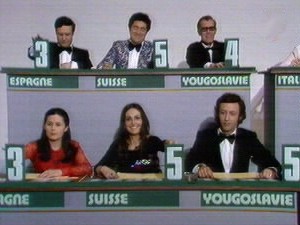 In early programmes, each country representative gave up to 5 points per song via the set of Blankety Blank
In early programmes, each country representative gave up to 5 points per song via the set of Blankety BlankWhoever has the most points after every country has given their results is the illustrious winner and can be crowned Champions of Europe, or something. Meanwhile, as so many countries want to join in the fun, the countries that don't win are sent back to the semi-final the following year. Unless you're the UK, France, Germany or Spain because you pump lots of money into it. Or Italy, because you went off in a huff for the best part of two decades, only to repent and waltz straight back into the final. Hurrah!
So the best song always wins, right? Well, let's look at the two other parameters that might affect the result.
1) Taste. Something that sounds good to us might not sound very good to the average Slovenian. Middle of the road songs tend to win.
2) Political Voting. Oh yes, don't deny it doesn't exist, this is one of the humorous mainstays of Eurovision every year. Do the Scandinavians really like each other's songs lots or do they just like each other? Is it pure coincidence certain countries' (say, Greece and Cyprus) insist on giving 12 points to the country closest to them every year, even if the song is very very bad? Will the onset of BSE/foot-and-mouth hurt the British chance of winning? You betcha it does.
So every year it purports to be a song contest, instead it tends to be a political needlematch. Many countries take it incredibly seriously. And this is what makes it incredibly entertaining.
In 2009 there was a massive, though largely invisible, change in the scoring, whereby each country now has both an expert panel and a televote, which are combined 50/50 to give the country's final results. For the record, the expert panel has five members and they judge on the dress rehearsal rather than the final performance. We did read who was on the UK panel for 2009, but the only name we recognised was Zoe Martlew, one of the judges from Maestro.
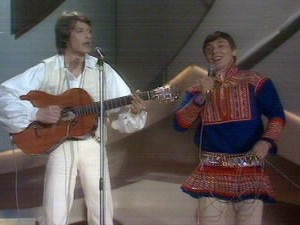 Admit it, you can't take this too seriously
Admit it, you can't take this too seriouslyFrom the British point of view, though, the voting was possibly not the biggest change in Eurovision 2009. If there's one overriding association that British audiences had with Eurovision, over and above the music, the spectacle and the general naffness, it was the Factor X that was Terry Wogan, he who had been commentating for the television viewers since the early seventies (for the more serious minded amongst you, put your telly on mute and listen to Ken Bruce on Radio 2). El Tel understands that Eurovision is so good, but only because it's so bad and his obviously alcohol-inspired dry, sarcastic commentary was hilarious (although seemingly not to everyone's taste). "Every year you think it can't get any worse..." but oh, it does. Who needs real names when you can just call the hosts "Dr Death and Little Bo Peep" and let them get on with it? A man who will say that after one song "that could win it," and after the next "I would comment but I was too distracted" after a woman in a tight suit was singing? And he gets just as flabbergasted when a really bad song gets top marks from somewhere like Bosnia-Herzegovina. Marvellous. However, he stepped down after the 2008 contest, forcing the BBC to grab the next available Irishman, who just happened to be Graham Norton. Henry Kelly must be cursing his luck that he wasn't in Broadcasting House that day. Anyway, Norton made an assured debut, and crucially knows when to shut up so that we can actually hear the songs properly, something that Wogan never mastered.
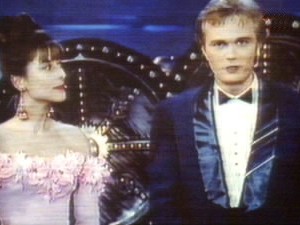 "We haff vays ov making you watch"
"We haff vays ov making you watch"Eurovision, then. Not to everyone's taste but it is what you make of it. Watch it with some friends over and you'll have a ball. Watching it on your own is a bit tedious with the 2 hours of songs with or without Wogan but still fun if you like it or don't watch. (Sage advice, no?) It's up to you really but it won't go away. No, it won't. It's here FOREVER... walks away, cackling evilly...
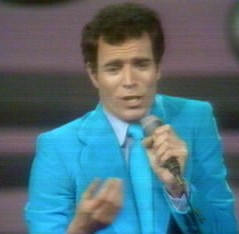 Nope, no idea who this is
Nope, no idea who this isMoving and grooving with the times
Because so many countries want to take part, they introduced a "relegation" system in the 1990s so that the bottom few countries had to sit out a year to let other countries have a go. In 2004 this changed and a second contest in the week before, a "semi-final", was held. The Big Four and the top ten from the year before went straight through to the contest proper (it's a bit like Going for Gold this, isn't it?). Everyone else had to compete for the final ten places. However, everyone watching had a say and televoting took place in the traditional way.
In 2008, with even more countries wanting to take part, a second semi-final was introduced in the week before the final. The Big Four and the host country remain pre-qualified for the final, but everyone else must take part in a semi-final, with the top ten countries from each semi-final progressing to the final. Each country only votes in the semi-final in which they are competing, with a random draw determining which semi-final the Big Four and the host country will vote in. For the first time in many years, each country's performance in the previous year's contest has no bearing. The Big Four has been subject to inflation, and became a Big Five when Italy returned in 2011.
In all the semi-finals, the points scoring is kept a secret until after the main event on Saturday (to avoid bias we suspect) and the qualifying countries are put in envelopes (real or electronic) and announced at random. The countries that don't qualify for the main event still vote during the Saturday show.
Key moments
Too many to mention, but one of the best has to be the chaos of the 1969 finals. When the votes had been added up, it was discovered that four countries had received 18 votes. There were no contingency plans in the EBU rulebook to cover a tie, so the hostess had no option but to declare a four-way tie. All four countries performed their winning songs at the end of the night.
Inventor
Accredited to Frenchman Marcel Baison, who set up the Italian "San Remo Song" Festival (still going) which gave the idea of the Eurovision.
Theme music
Te Deum, composed by Marc-Antoine Charpentier.
Trivia
The UK has come second in the competition a staggering 15 times. Its five victories were performed by Sandie Shaw (Puppet on a String, 1967), Lulu (Boom Bang a Bang, 1969), Brotherhood Of Man (Save Your Kisses For Me, 1976), Bucks Fizz (Making Your Mind Up, 1981) and Katrina and the Waves (Love Shine a Light, 1997).
There's no restriction on the nationality of performers, which explains how Australian Gina G represented the UK with "Just a Little Bit" in 1996, and how Switzerland came to be represented in 1988 by Céline Dion from Canada.
The winner of the competition gets first refusal on hosting the contest the following year. In the case of repeat winners (e.g. Ireland) or poorer countries, sometimes the costs involved put a strain on the national broadcasters. The sitcom Father Ted had fun with this in a famous plotline in which Ireland deliberately send an awful song in order to avoid the cost of hosting the contest, but in real life, countries can and do turn down the opportunity to host the contest, electing for the honour to go instead to any offering broadcasters. For example after Monaco won in 1971, they declined as there wasn't a large enough hall in the principality, and since the French didn't want it, it was offered to the BBC, with the result that the 1972 contest was held in Edinburgh. Luxembourg also declined the honour in 1973, after winning for the second time in a row. It was again given to the BBC which hosted it in Brighton in 1974.
Italy stopped taking part in the ESC after 1993, claiming a "lack of interest" in the competition; an entry in 1997 only hardened the position of broadcaster RAI. Time marched on, opinions mellowed, and the country returned in 2011 with "Big Five" status, meaning they automatically qualify for the final. Luxembourg don't participate either, despite having previously been one of the most successful countries; they were relegated following a poor performance in 1993, and haven't returned.
Eurovision on Radio 1? That's how the BBC worked in '69 and '70: Radio 1 produced the late evening shows, such as the 10pm Eurovision Song Contest. The shows were simulcast on Radio 2's long wave and VHF transmitters.
For the record, the UK jurors for the 2009 contest were (and we only got the names and had to look up the rest ourselves, so apologies if we've got the wrong Paul Edwards, or whoever):
- Semi-final
- Deborah Chapman (author?)
- Paul Edwards (dean of the Royal College of Music)
- David Larkin (?)
- Anne Mannion (stage actress)
- Chris Stewart (musician, ex-Genesis)
- Final
- Paul Goodey (oboeist and tutor at the Royal Northern College of Music)
- Steve Allen (might be the LBC presenter, or might be the former Deaf School and Original Mirrors singer, or might be neither...)
- Zoe Martlew (composer, cellist and Maestro judge)
- Keith Hughes (perhaps the music historian involved in compiling various compilation CDs for Universal?)
- Jasmine Dotiwala (MTV producer and pop pundit)
From 2011 to 2015, the BBC selected the song and performer without consulting the public. The first three entrants were announced on early evening magazine programme The One Show. In 2014 and 2015, the BBC Red Button spent some of its small budget on a special show to announce the competitors. Eurovision Reveal (3 March 2014) and Our Song for Eurovision 2015 (7 March 2015) both featured a performance and an interview with Scott Mills.
To mark the contest's 60th anniversary in 2015, the EBU decided to invite Australia to compete as a one-off. The contest has a loyal following Down Under, having been broadcast by SBS for over 30 years. Former Australian Idol winner Guy Sebastian was chosen to represent Australia at the final in Vienna, singing self-penned song Tonight Again. It was announced that Australia would be able to defend their crown in 2016, in a European city of their choice, should they win. In the event, Sweden took home the honours, however Australia did finish in a respectable fifth place. As a result of positive feedback to Australia's participation, it was announced in November 2015 that the country would be invited to compete in the 2016 contest. However this time they would not be granted a pass to the final, and would have to take part in one of the semi-finals to secure their place in the final.
No contest was held in 2020 as a consequence of the Covid-19 pandemic.
Web links
Pictures
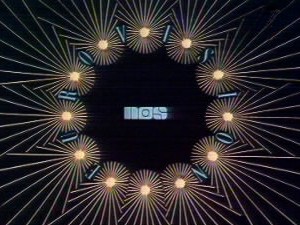 The pine-needle style logo for the Eurovision.
The pine-needle style logo for the Eurovision.See also
Junior Eurovision Song Contest
Weaver's Week reviews:
- 2003: Eurovision Song Contest
- 2004: Qualifier | Final | Final analysis
- 2005: Qualifier | Final
- 2006: Semi-final | Final | Voting analysis
- 2007: Semi-final | Final | Voting analysis
- 2008: Voting predictions | Semi-final | Final
- 2009: Semi-final | Final
- 2010: Semi-final | Final
- 2011: Semi-final | Final
- 2012: Semi-final | Final
- 2013: Semi-final | Final
- 2014: Semi-final | Final
- 2015: Semi-final | Final | Voting analysis
- 2016: Semi-final | Final
- 2017: Semi-final | Final
- 2018: Semi-final | Final
- 2019: Semi-final | Final
- 2020: Europe Shine a Light and Come Together

